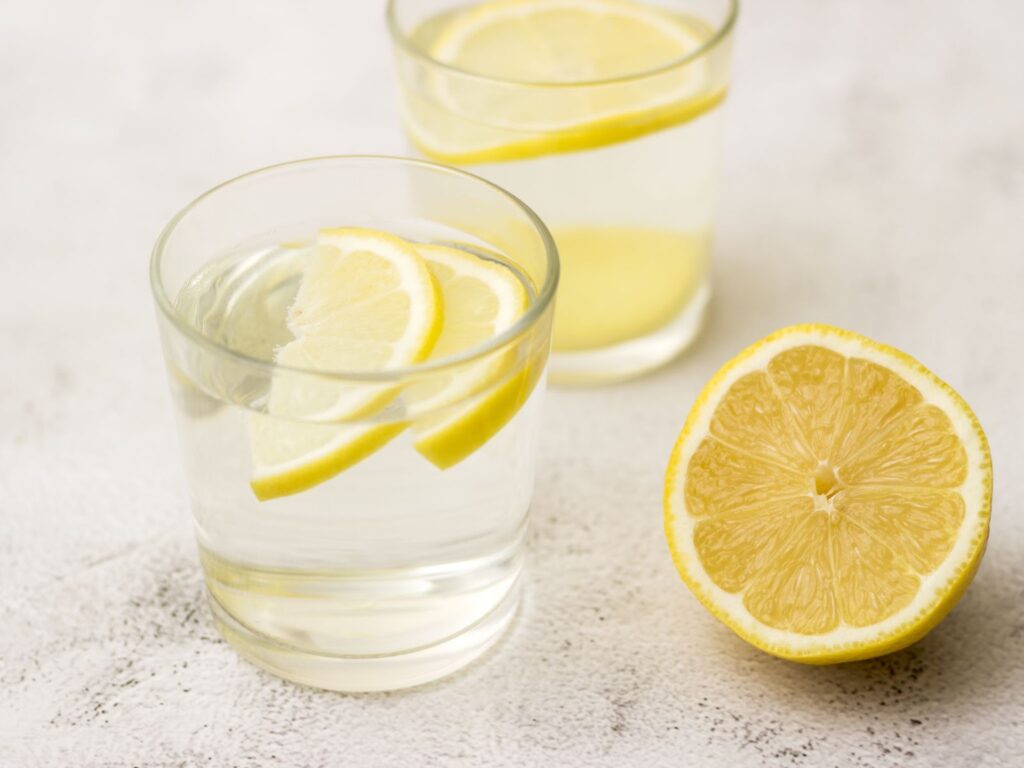While lemon water is celebrated for its detoxifying properties and refreshing taste, it might not be as harmless as it seems. Lemons are highly acidic, and acidic foods and beverages can have a softening effect on tooth enamel. Your dentist can attest to the damage this could cause.
Why Do People Drink Lemon Water?
Lemon water is an excellent source of vitamin C, which is essential for a healthy immune system. A single lemon can provide a significant portion of your daily vitamin C requirement, helping to ward off illnesses and keep you feeling your best.
Lemon water can aid digestion by encouraging the production of bile, which is necessary for breaking down food in your stomach. Many people find that starting their day with a glass of lemon water helps to stimulate their digestion and keep things moving smoothly.
Lemon water is a great way to stay hydrated and add a burst of natural flavor to your daily water intake, making it easier to meet your hydration goals. So while it’s important to be mindful of your enamel, the benefits of lemon water make it a refreshing and healthful addition to your routine.
The Science Behind Lemon Water
Lemons contain citric acid, which gives them their characteristic tangy flavor. When you squeeze a lemon into water, this citric acid is diluted but still present. The pH level of lemon water typically ranges from 2 to 3, placing it in the acidic range. A neutral pH is 7, and anything below that is considered acidic.
Over time, if your teeth are repeatedly exposed to acidic substances without adequate protective measures, this can lead to enamel erosion. As enamel wears away, the underlying dentin becomes more exposed, increasing the likelihood of tooth sensitivity and decay.
Tips to Enjoy Lemon Water Safely
Luckily, you don’t have to give up your beloved lemon water to protect your dental health. Here are some friendly tips to help you enjoy this refreshing drink while minimizing its impact on your teeth:
- Use a Straw: Drinking lemon water through a straw can reduce direct contact with your teeth, limiting the erosion potential.
- Dilute It More: Adding more water to your lemon juice can decrease the overall acidity of the beverage.
- Rinse with Plain Water: After enjoying lemon water, rinse your mouth with plain water to help wash away lingering acids.
- Consume in Moderation: Enjoy lemon water in moderation rather than sipping it throughout the day to lessen prolonged exposure.
Signs of Acid Erosion
One of the first signs of acid erosion from lemon water is increased tooth sensitivity. You might notice discomfort when consuming hot, cold, or sweet foods and drinks. Additionally, if your teeth appear more yellow, this could be due to the thinning enamel exposing the dentin underneath. If left unchecked, severe erosion can result in cracking and other structural damage to your teeth.
Should I Brush My Teeth Before Drinking Lemon Water?
Timing Matters
Ideally, you should wait at least 30 minutes after brushing before consuming anything acidic. This allows your saliva to build up and help protect your enamel from the acid in the lemon water.
The Role of Saliva
Saliva plays a critical role in maintaining oral health. It helps wash away food particles and neutralizes acids, protecting your teeth from erosion. By waiting 30 minutes after brushing, you give your saliva a chance to coat and protect your enamel before exposing it to the acidity of lemon water.
Brushing After Drinking Lemon Water
It’s not recommended to brush your teeth immediately after drinking lemon water, as the acid can soften your enamel, making it more vulnerable to abrasion from brushing. Instead, rinse your mouth with plain water and wait at least 30 minutes before brushing to give your enamel time to re-harden.
Who Should Not Drink Lemon Water?
Individuals with Sensitive Teeth
If you already have sensitive teeth, drinking lemon water can make things worse. The acidity of the beverage can increase sensitivity and make it more challenging to enjoy hot, cold, or sweet foods and drinks. It’s best to avoid lemon water or consume it in moderation if you have sensitive teeth.
Those with Acid Reflux or GERD
Lemon water can worsen symptoms of acid reflux or gastroesophageal reflux disease (GERD). Its acidity can irritate the esophagus and increase the production of stomach acid, leading to heartburn and discomfort. If you have acid reflux or GERD, it’s best to avoid lemon water and opt for less acidic beverages.
Those with Mouth Ulcers
Lemon water can be painful for individuals with mouth ulcers or canker sores. Its acidity can irritate the sores and delay healing. It’s best to avoid acidic drinks like lemon water until sores have healed.
Protecting Your Teeth
Lemon water offers several health benefits, from hydration and vitamin C to improved digestion. However, the acidity of lemon water can pose some risk to dental health, particularly if consumed daily. By taking precautions like drinking through a straw, rinsing your mouth with water, and waiting before brushing your teeth, you can enjoy the benefits of lemon water without compromising your smile.If you’re concerned about the impact of lemon water on your teeth or looking for more personalized advice, consider booking a consultation with one of our experts at Shin Dentistry. Our team is here to help you maintain a healthy, beautiful smile while enjoying the foods and drinks you love.



